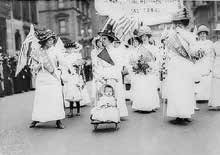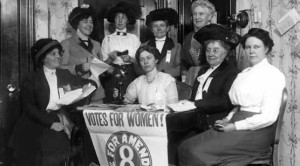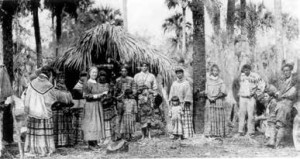Saluting the Despotism of the Petticoat
During Women’s History Month
by Lois Bolin
Old Naples Historian
You’ve come a long way, baby,” was the Philip Morris slogan, that reached out during the height of the feminist movement targeting professional women in 1969, who understood “it was a woman thing” to “find your voice.” (PM’s subsequent marketing slogans.)
Abigail Adams didn’t need a slogan in 1776 to remind her husband, John Adams, to “remember the ladies” in the new code of laws.
Mr. Adams, knowing full well where power resided, lovingly replied that the men must fight the “despotism of the petticoat,” knowing full well that women’s right to vote was only a matter of time.
That time came in March 1869 when Indiana’s representative introduced a Joint Resolution for the federal women’s suffrage amendment.
After fifty-one years of continuous campaigning for the right to vote, which included 480 legislature campaigns; 47 state constitutions campaigns; 277 state party conventions; and 19 campaigns with 19 successive Congresses, the 19th Amendment became law on August 26, 1920.
Throughout history, women have always been willing to endure whatever was necessary for important causes. Deaconess Harriett Bedell, an Episcopalian missionary, who came to Collier County in the 1930s, to work with the Seminole and Miccosukee Indian Tribes, is a perfect example. She endured mosquitos, the sweltering heat and outdated paradigms to win their trust encouraging them to produce their handiworks of basket weaving and doll making, which she promoted around the county.
 While she would tolerate mosquitoes and blistering heat for her cause, the Deaconess would not accept disrespect of “her” beloved Indians. This passion led her to Washington, D.C. to lobby for the protection of their handicrafts from foreign knock-offs. Her visits to the Department of Labor, the American Trade Authority and the Japanese Embassy, where she gave them a piece of her Christian mind about their replicas, ultimately led to the U.S. Government to honor her request.
While she would tolerate mosquitoes and blistering heat for her cause, the Deaconess would not accept disrespect of “her” beloved Indians. This passion led her to Washington, D.C. to lobby for the protection of their handicrafts from foreign knock-offs. Her visits to the Department of Labor, the American Trade Authority and the Japanese Embassy, where she gave them a piece of her Christian mind about their replicas, ultimately led to the U.S. Government to honor her request.
Weaving the Stories of Women’s Lives is the 2015 theme marking the 35th Anniversary of National Women’s History Month. The following women are examples of stories that are woven into the fabric of our local history: Tommie Barfield, first public school superintendent; Mamie Tooke, first woman bank president; Lynn Hixon-Holley, first woman attorney and judge; Mary Jo Casey Miller, first woman president of NABOR; Alma Cambridge, founder of first nursery for the African American community (Fun Time Early Learning Academy); and Bonnie McKenzie Loveday, Naples first woman elected as mayor.
A new millennium tapestry of Naples history is being woven with the spiritual threads of Abigail Adams, suffragettes and the Deaconess as these modern women are using their voices not because ‘it’s a woman thing’ – but because it’s an American Constitution thing.
Abigail Adams’ spirit runs deep in Gina Voss Edwards, journalist and founder of Watchdog City. Using her voice to keep the public informed, she recently challenged the exorbitant public records fee policy of the County Clerk, which later led to her coordinate a public forum called, The First Amendment Foundation Town Hall.
The Deaconess is no doubt applauding Kelly Lichter’s commitment to children’s education. As a former teacher, Kelly’s concerns, such as the growth of anti-Americanism in textbooks, led her to become the driving force behind Mason Classical Academy.
With Susan B. Anthony whispering in the ear of businesswoman Erica Donalds, parents are now finding an outlet where their voices can be heard and Common Core information can be found through the non-for-profit, Parents ROCK.
Over coffee with a friend, Common Core and history textbooks came into the conversation, which led me to research both and subsequently ask to join the group to review a few history books – not as a parent – but as a curious ordinary citizen. These reviews led to outcries of book censorship. News flash! Censorship is already here. Finding little information on the Constitution or America’s historical development, including America’s self-government experiment; I couldn’t help but wonder what Abigail Adams would think. Would Deaconess Bedell, also a teacher, offer up a piece of her Christian mind to book publishers? I think so because on some level women know that cultural amnesia is an insidious disease that can render us victims if we ever forget our God given liberties.
Yes, we’ve come a long way, baby since the pledge to fight the “despotism of the petticoat.” So this March, during National Women’s History Month, use your voice to celebrate the women whose stories are woven into the fabric of your life.




Leave a Reply
Want to join the discussion?Feel free to contribute!